Even though Coursera and Khan Academy are well-known competitors, they serve distinct purposes. Coursera focuses on delivering high-quality academic and professional courses, offering content from top universities and companies.
On the other hand, Khan Academy is a free resource that aims to help students, educators, and self-learners access educational tools for K -12 subjects, test prep, and foundational knowledge.
Further in the article, we will explore both platforms’ differences, overviews, course categories, and specific details. This guide will help you understand which platform best suits your needs based on your goals.
Coursera vs. Khan Academy: Key Differences
Coursera and Khan Academy offer valuable learning experiences but cater to different needs. Here’s a quick overview of key features you can consider when choosing a platform.
| Feature | Coursera | Khan Academy |
|---|---|---|
| Free Trial Period | 7 days on Coursera Plus | No free trial |
| Free Courses Available | Yes, limited selection | Yes, all courses are free |
| Price Starts From | $49 per month (Coursera Plus) | Free |
| Certification | Yes (on paid plans) | No |
| Course Categories | Business, Tech, Data Science, Health, Arts, and more | Math, Science, Humanities, Economics, and more |
| Accredited University Partnerships | Yes (Stanford, Yale, Google, etc.) | No |
| Best For | Professionals, students, career advancement | School students, self-learners, educators |
| Offline Learning | Available with the Coursera app | No (only online access) |
| Skill Level | Beginner to advanced, professional-level certifications | Beginner to intermediate, mainly school-level content |
Khan Academy is an ideal choice for beginners due to its easy-to-follow content and free access to K -12 subjects. For experienced learners seeking professional growth, Coursera offers more advanced courses and certificates from top universities.
Brief Overview: Coursera Vs. Khan Academy
Here, we will take a quick overview of Coursera and Khan Academy. Take a look at their establishment year and other details for your information;
Coursera Overview
Launched in 2012, Coursera offers courses across various categories, including business, technology, data science, Language learning, personal development, social science, maths & logic, health, and arts.
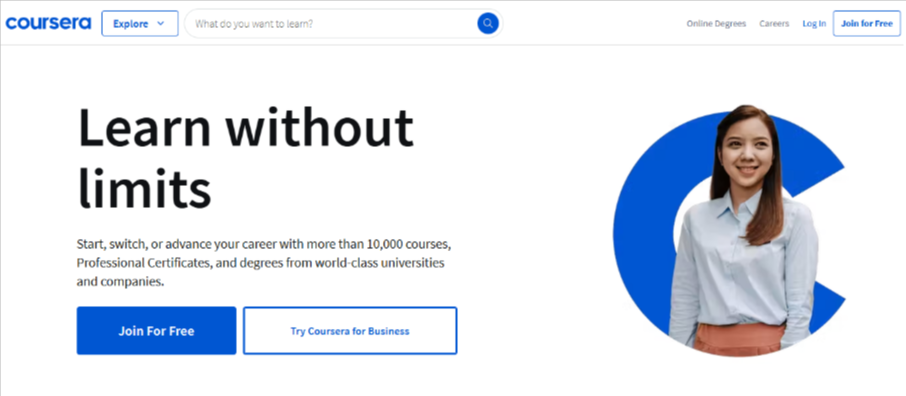
It partners with prestigious universities and companies like Stanford, Yale, Duke, Penn, Microsoft, Google, and many more. Coursera is widely popular among professionals, students, and businesses seeking skill development.
The platform’s mobile app, with a 4.7 rating on the Google Play Store, allows users to learn on the go. Coursera’s paid plans offer certificates highly recognized in the industry, making it a great choice for career advancement.
Khan Academy Overview
Khan Academy was established in 2006 by Sal Khan. It is a non-profit platform designed to offer free learning tools for students and teachers.
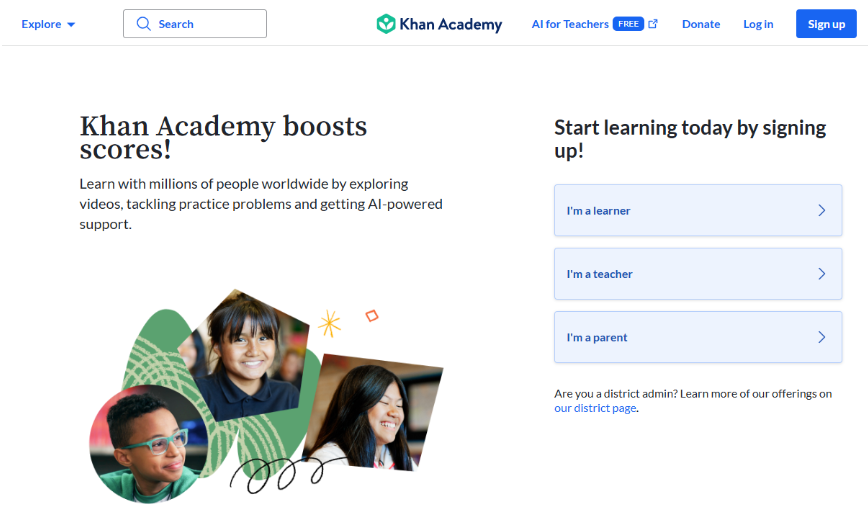
The platform focuses on subjects like math, science, economics, and the humanities. It has a 4.2-star rating on the Google Play Store for a mobile app. More than 10 million students use the Khan Academy app for learning.
The primary goal of this platform is to make education accessible to everyone, from K-12 students to adult learners, without any cost, encouraging a community of independent learners.
Course Content and Categories
Take a closer look at each platform’s course content and categories, which will help you decide which is best suited for your learning goals.
Coursera Content & Categories
Coursera offers a wide range of degree programs, certificates, and career-focused courses. Coursera categories included on the platform are business, technology, data science, health, Physical Science & Engineering, Social Sciences, arts, and humanities.

The popular courses on Coursera are The Science of Well-being, AI for Everyone, Deep Learning, Data Science, Social Psychology, etc. Most of these courses are accredited through partnerships with 350+ universities and companies.
Coursera also provides professional certifications that are recognized globally. Many courses are available in both beginner and advanced levels, offering a structured learning experience.
Khan Academy Content & Categories
Khan Academy covers K-12 subjects, including math, science, humanities, economics, and test prep. It’s a go-to platform for students looking for foundational knowledge or exam preparation.
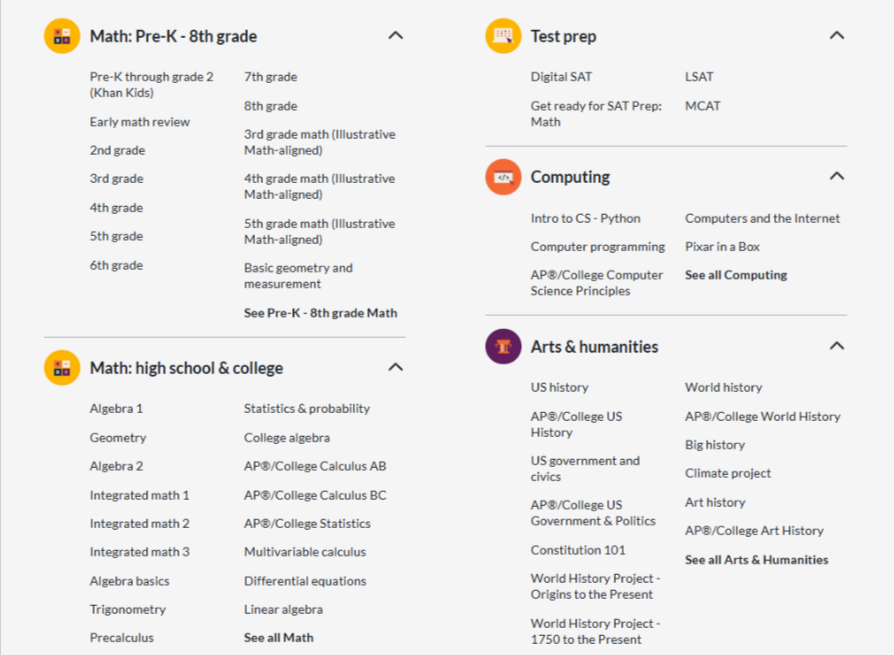
The best courses on the platform are math tutorials for all grades, science, economics and finance, arts, and SAT prep. While Khan Academy doesn’t offer accredited certifications, it aims to make learning accessible for everyone.
It focuses on building a strong knowledge base, offering easy-to-understand lessons for beginners and self-learners. The platform’s primary mission is to make education free.
Coursera Vs. Khan Academy: Free Offerings
Both Coursera and Khan Academy offer free learning options, but they differ in how they present them. Coursera provides free trials and courses, while Khan Academy is entirely free for all users.
Coursera Free Trial
Coursera offers a 7-day free trial on Coursera Plus, which gives new users access to premium content with no restrictions. During the free trial, learners can explore a variety of courses across different categories from a few hours of courses.

Coursera offers unlimited course access to 10,000+ content with certifications from accredited universities and companies. Additionally, Coursera provides a limited free course for budget-conscious learners.
However, the free versions or free audits do not include certification. This flexibility helps learners experience high-quality content before committing to a subscription. Also, there is a 14-day money-back guarantee for you to cancel the plan if you upgrade to the subscription.
Khan Academy Free Trial
Unlike Coursera, Khan Academy does not offer a free trial. Instead, the platform is completely free for all users, making it accessible to anyone who wants to learn, from beginners to experienced learners.
Every course, whether in math, science, or test prep, is available at no cost. The free access to all courses makes Khan Academy an attractive option for students and self-learners. This enables them to learn at their own pace without any financial burden.
Costs Of Coursera And Khan Academy
Here, it is clear that only Coursera offers various pricing plans, from a single learning program to a subscription-based model. Khan Academy is free of cost.
Coursera Pricing Plans
Coursera pricing options are available for different learners’ needs, from individual courses to full degree programs. Here is an overview of their plans:
| Plan | Cost | Description |
|---|---|---|
| Coursera Plus | $49 per month | Unlimited access to all courses and certifications. |
| Specialization | $49-$79 per month (varies) | Course bundle to master a specific skill or subject. |
| Degree Programs | Varies (Starts from $9,000) | Full degree programs from accredited universities. |
Coursera Plus gives learners access to 10,000+ courses and certificates for $49 per month. It’s ideal for those who wish to explore multiple topics or need certifications for career growth. Also, learners can get free courses with certificates through Google Professional Certificate.
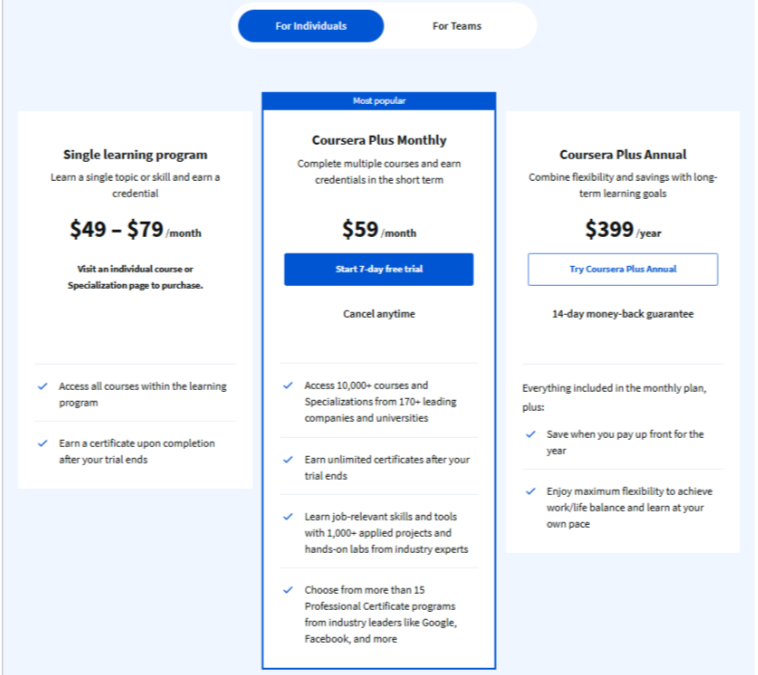
The Specialization plan focuses on mastering specific skills, such as data science or business management, through a series of courses. For those looking for a more formal education, degree programs offer accredited programs from top universities.
Besides these multiple cost options, Coursera offers a Coursera Plus $1 dollar offer for new users for the first month. However, it is not active yet. Follow Coursera’s social media handles to get the opportunity to claim this amazing promotional deal.
Remember, Coursera offers a refund policy to protect your investment.
Khan Academy Pricing Plans
Khan Academy is entirely free to use, offering no paid plans. All resources, including videos, exercises, and practice problems, are free for anyone.
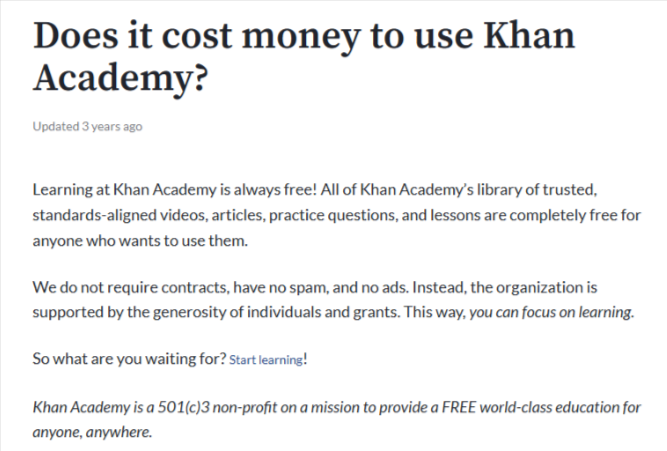
The platform is built to provide accessible education for everyone, from school students to individual learners. There are no hidden fees, and users can access the content without any restrictions. Khan Academy is a good option for learners new to skills and for school and college students.
Pros & Cons: Coursera Vs. Khan Academy
When choosing between Coursera and Khan Academy, it’s important to consider the strengths and weaknesses of each platform. Let’s explore the pros and cons to see how each can serve different learning needs.
Coursera Pros And Cons
Coursera offers a range of options for both personal learning and career advancement. However, it also has some limitations to consider.
Coursera Pros
- Wide Range of Courses: Coursera offers courses from top universities and companies across various fields.
- Flexible Learning: Allows learners to study at their own pace with multiple learning formats.
- Professional Certifications: Provides certificates upon course completion that are useful for job seekers and professionals.
- Access to Degree Programs: It offers full-degree programs, making it a legitimate option for career advancement.
- Accredited Content: Partners with reputable universities like Stanford, Yale, and Google for certification.
- Paid Plans Offer Premium Features: Paid plans include additional resources, such as graded assignments and peer reviews.
- Mobile Access: Coursera’s app allows you to learn on the go, enhancing flexibility.
Coursera Cons
- Limited Free Content: Free courses offer limited access and don’t provide certificates or assignments.
- Subscription Fees for Full Access: Coursera Plus requires a monthly fee for unlimited course access.
- Course Completion Time Pressure: Some courses have a timeline, which may feel restrictive for certain learners.
- Quality Varies Across Courses: Not all courses are equally engaging or valuable for career development.
- Degree Programs Are Expensive: Full degree programs can be quite expensive, making them less accessible for some.
Khan Academy Pros And Cons
Khan Academy provides free, quality educational content, but it has some restrictions compared to paid platforms like Coursera.
Khan Academy Pros
- Completely Free: All content, including lessons and practice exercises, is free.
- Wide Range of Subjects: Covers K-12 topics and some college-level subjects, providing comprehensive learning material.
- No Subscription Fees: Learners can access content without worrying about paying for a subscription.
- Interactive Learning Tools: Includes practice exercises and quizzes to help reinforce learning.
- User-Friendly Platform: It offers a simple, easy-to-navigate interface for all ages and learning levels.
Khan Academy Cons
- Limited Advanced Content: It lacks in-depth courses for professionals or advanced learners.
- No Formal Certification: This does not offer certificates or any accreditation upon course completion.
- No Degree Programs: They cannot replace university degrees or offer professional certifications.
- Limited Focus on Career Skills: Focuses mainly on foundational subjects rather than career-oriented skills.
- Lack of Social Learning Features: There are no peer reviews or interactions with other students to foster a collaborative learning experience.
Coursera and Khan Academy offer valuable learning opportunities but cater to different needs and learners. Coursera is ideal for professional certifications or in-depth courses from top universities, while Khan Academy is perfect for foundational learning, especially for school students.
What Do Customers Say On Coursera And Khan Academy?
Here, I have gathered feedback from various students and trusted sources who enrolled in the platform and shared their views. Let’s look at what users have to say.
Coursera Reviews
1. Manan Shah, a former Coursera employee, shares his positive experience with the platform’s courses. He took Machine Learning, Physics, and Human Physiology classes, finding each one valuable but challenging.
Manan initially struggled with managing multiple courses simultaneously but succeeded when focusing on just three. He particularly appreciated the concise yet content-rich 20-30-minute lectures from college professors and found the structured assessments helpful for retaining knowledge.
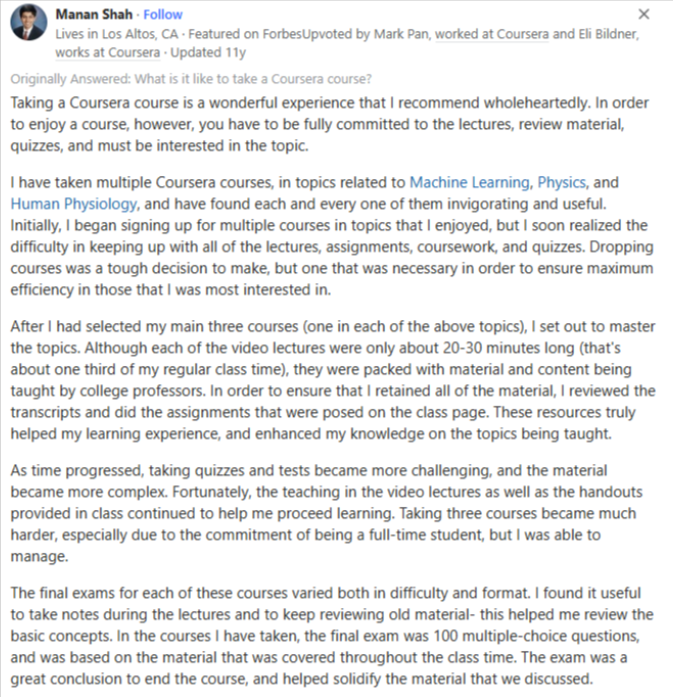
2. Gabriel Sibaveun gives Coursera four stars, praising its step-by-step approach to learning. He appreciates that the platform doesn’t rush through the material and allows students to progress at their own pace.
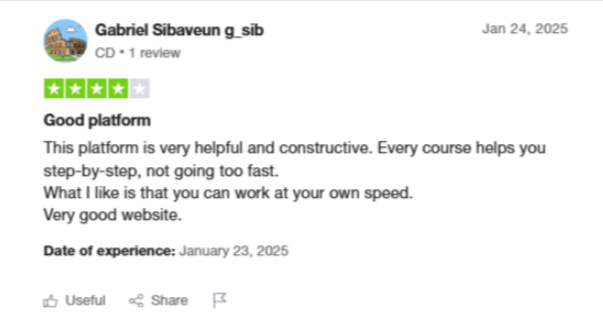
Khan Academy Reviews
1. An educational expert on Quora highlights Khan Academy’s effectiveness in mathematics learning. They point out six key strengths: curriculum structure, engaging video lessons with visual aids, interactive practice exercises with immediate feedback, personalized learning that adapts to individual paces, free accessibility for all users, and additional resources in subjects beyond math.
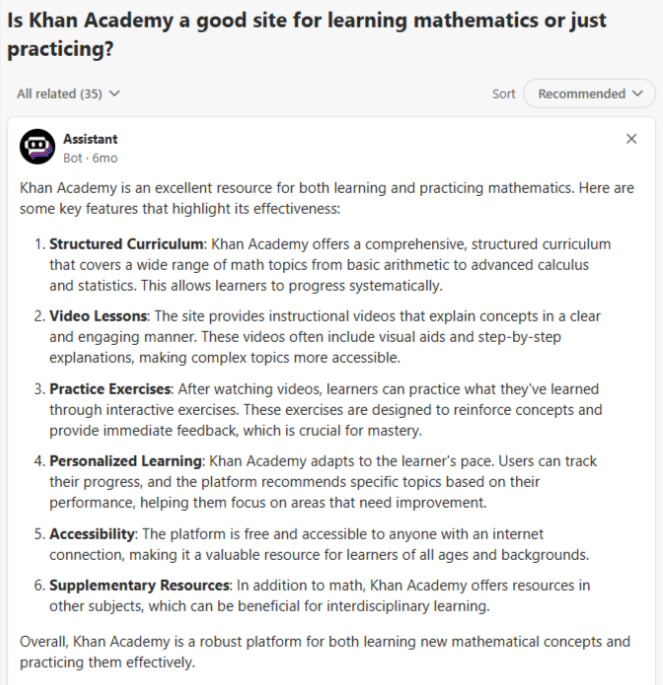
2. Learnmath says that he failed Geometry despite being placed in advanced classes; they felt discouraged and “bad at math.” They were considering Khan Academy courses in Algebra 1, Geometry, and Algebra 2 to build their confidence and understanding, hoping to catch up with classmates.
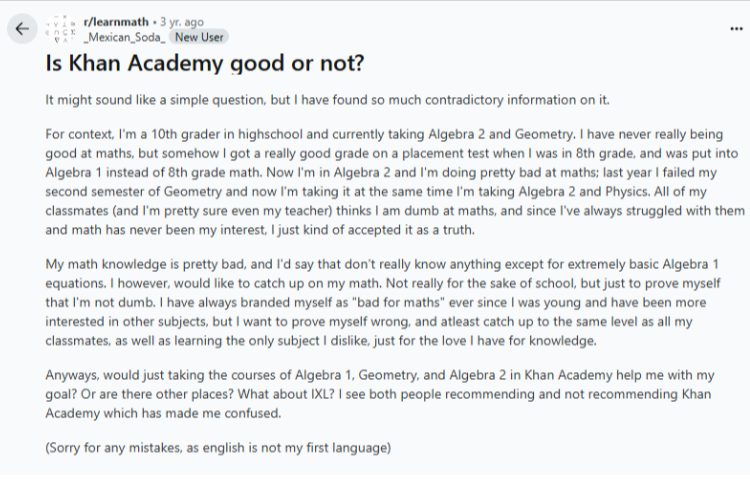
Coursera Vs. Khan Academy: Select The Best Platform
I have tried Coursera and Khan Academy platforms for a few months; compared to both, I found Coursera to be an excellent choice for professional development.
It particularly helped in business management by providing the Foundation of Business Management course and analysis on Business and project management. The certificates from top universities like Yale gave me an edge in job applications.
On the other hand, Khan Academy helped me strengthen my foundational knowledge in subjects like mathematics and science. If you’re looking for in-depth and professional certifications, Coursera is the best way to sign up. But Khan Academy is free, so you can start learning core subjects.
Related Reads:
Conclusion: Khan Academy Is Completely Free For All Learners
The choice between Coursera and Khan Academy depends on your learning goals and budget. If you want to pursue career certifications, access high-quality professional courses, or earn degrees, Coursera is the ideal platform.
However, Khan Academy excels if you’re looking for a free, user-friendly resource to strengthen basic knowledge in subjects like math or science.
Both platforms are valuable in their own way, and understanding your needs is key to selecting the best option for you.
FAQs
It depends on your goals. Coursera is ideal for career-focused certifications, degrees, and professional courses, while Khan Academy is better for free foundational learning and K-12 subjects.
The free courses on Coursera do not offer certificates. However, you can audit courses for free; certificates are available only with paid plans or by purchasing the course.
Khan Academy is completely free for all users. It offers educational resources for K-12 subjects, test prep, and more, with no charges or subscription fees.
Khan Academy does not provide certifications. It focuses on delivering free educational content and building foundational knowledge, particularly for school students and self-learners.
Coursera offers courses for all skill levels, from beginner to advanced. It provides foundational courses as well as more specialized programs for career advancement and higher education.
